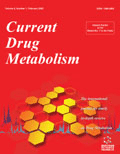To find the most relevant journal, please insert appropriate keyword to facilitate search.
Search Results: CDM

Current Drug Metabolism
ISSN: 1389-2002 (Print)
eISSN: 1875-5453 (Online)
More specifically, in vitro and in vivo drug metabolism of phase I and phase II enzymes or metabolic pathways; drug-drug interactions and enzyme kinetics; pharmacokinetics, pharmacokinetic-pharmacodynamic modeling, and toxicokinetics; interspecies differences in metabolism or pharmacokinetics, species scaling and extrapolations; drug transporters; target organ toxicity and interindividual variability in drug exposure-response; extrahepatic metabolism; bioactivation, reactive metabolites, and developments for the identification of drug metabolites. Preclinical and clinical reviews describing the drug metabolism and pharmacokinetics of marketed drugs or drug classes.
Special Issues With Active Call for Papers
Therapeutic drug monitoring in clinical applications
Therapeutic Drug Monitoring (TDM) is a special issue focusing on the monitoring of drug concentrations in clinical therapy, aiming to optimise drug therapy, reduce drug interactions and ensure patient safety through quantitative analysis of drug concentrations in patients' body fluids.TDM is of great significance in the current medical field, especially in the fields of individualised therapy, assessment of drug-drug interactions, determination of drug compliance, and prevention of drug toxicity, etc. It has a key role... see more
Safety evaluation of vaccine combination
Vaccine combination safety evaluation is a critical field within immunology and public health that focuses on assessing the safety and efficacy of combining different vaccines to maximize protection against various diseases while minimizing potential adverse effects. This process is significant because it ensures that vaccines can be administered together without compromising the immune response or causing harm to the individual receiving them. The current relevance of this field is heightened due to the ongoing development... see more
Metabolism-mediated xenobiotic toxicity
Considering the potent modulation of biotransformation enzyme expression and activities by various therapeutic drugs and environmental chemicals, and the commonly combined exposure of humans to both drugs and the ever increasing environmental pollutants simultaneously, knowledge about the combined toxic effects by modulating biotransformation enzymes, such as P450s, UDP- glucuronosyltransferases, and sulfotransferases in regard to changes, either activation or detoxification, in the toxicity of the coexposing compounds, is critically important in creating strategies and measures for... see more
Impact of brain tissue binding and plasma protein binding of drugs in DMPK
The impression of brain tissue binding (BTB) or plasma protein binding (PPB) in Drug Metabolism and Pharmacokinetics is critical to understanding the distribution, efficacy, and potential toxicity of drugs that target the central nervous system (CNS). BTB and high PPB influence the distribution of drugs in the body and their pharmacokinetic properties. Drugs with high PPB may have reduced bioavailability and prolonged half-lives, leading to potential drug interactions and toxicity. Drugs that exhibit high BTB... see more
Exploring oxidative stress and the anti-oxidant defense system in chronic diseases: therapeutic strategies and future perspective
Ageing is facilitated by oxidative stress (OS), which happens spontaneously. Several studies have demonstrated that OS over an extended period of time has a role in the emergence of several chronic illnesses. Diabetes, cancer, and heart disease are a few examples of these ailments. An imbalance between the body's antioxidants and free radicals can lead to OS. During regular metabolic activities, free radicals are produced by the body's cells. But these free radicals are also... see more
Interaction between drugs and endocrine diseases
The introduction of highly active antiretroviral therapy accelerated studies and our understanding on the interaction between pharmacological therapies and endocrine diseases. Drugs can precipitate endocrine via different mechanisms, including direct alteration of hormone production and secretion, dysregulation of hormonal axis, effects on hormonal transport, receptor-binding, and cellular signalling. Common drug-induced endocrine disorders include disorders of carbohydrate and lipid metabolism, electrolyte handling disturbances and drug-induced thyroid, adrenal, and gonadal disorders. Furthermore, endocrine disorders have been shown... see more